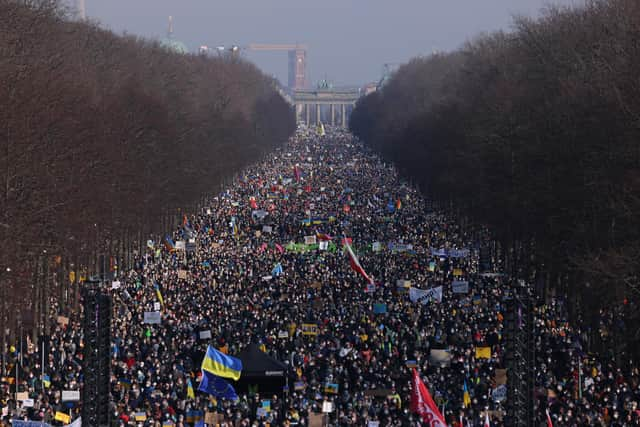Russia invades Ukraine: Seven ways the world has changed since Vladimir Putin went to war – Scotsman comment
A week after Vladimir Putin ordered Russia’s vast war machine to invade Ukraine, the consequences of his supremely callous decision are plain to see in the suffering and grief of his countless victims.
However, if Putin thought the rest of humanity would just sit idly by and watch a delusional egomaniac turn his sick dreams into a real-life nightmare, he was very much mistaken.
Advertisement
Hide AdAdvertisement
Hide AdSeven days into this cruel and unnecessary war, we are in now living in a very different world and here are seven ways it has changed:
First, the European Union – reeling after Brexit and Covid and beset by internal concerns over the rise of illiberal politics in countries like Hungary – had seemed weak and lacking a sense of purpose.
No more. It has been reborn as a defender of freedom in stark contrast to Putin’s tyranny in Russia, where journalists have been banned from reporting the truth and thousands of anti-war protesters, including primary school children, have been arrested.
Second, Putin’s actions have succeeded where several US presidents failed in persuading sleeping giant Germany to meet the Nato target for defence spending of two per cent of GDP. Any qualms, dating back to the Second World War, about having a strong military are gone.


Announcing a 100-billion-euro fund to boost the German armed forces, Chancellor Olaf Scholz said, “we must invest significantly more in the security of our country, in order to protect our freedom and democracy”.
And he went further. It was no less than “Germany’s historical responsibility” to make sure Putin “does not turn the clocks back”.
Third, Russia is now an international pariah on a par with North Korea. Trade and business links have become reputationally toxic, sparking a mass divestment on a scale unprecedented in modern times.
London, so awash with the ill-gotten fortunes of Putin’s friendly oligarchs that it was dubbed Londongrad, is being forced to clean up its act. And Russia’s national sporting teams are being thrown out by one competition after another.
Advertisement
Hide AdAdvertisement
Hide AdFourth, countries that have traditionally sought to remain neutral have joined the rest of the West in sanctioning Russia and supporting Ukraine.
Sweden, which was neutral during both World Wars and the Cold War, is sending thousands of anti-tank weapons to Ukraine, its first shipment of arms to a country at war in more than 80 years.
Even Switzerland, whose banks’ clients include many Russian oligarchs, closed its airspace to Russian flights and banned some leading Russian figures from entering the country.
It is, as one Scottish commentator put it eloquently, a “species-wide revolt”.
Fifth, while on February 4, China and Russia issued a joint statement declaring the “friendship between the two states has no limits”, following the invasion there have been signs Putin may have gone too far for Beijing.
For example, its foreign minister recently described the situation in Ukraine as “warfare”, using a W-word forbidden in Russia. China’s intentions remain unclear, but if a gap is opening the West should be quick to jump in and persuade its rulers of the obvious benefits of world peace.
Sixth, the West’s need to rid itself of Russian oil and gas has given renewed impetus to the rise of renewable energy.
Harnessing the free power from the wind, sea and sun would remove the need for democracies to make ethically compromised deals with dictators the world over, in addition to tackling what is still the greatest threat to humanity, climate change.
Advertisement
Hide AdAdvertisement
Hide AdLast, and perhaps of most immediate importance, if anyone doubted that Ukraine was a proud nation in its own right, then the inspirational leadership shown by President Volodymyr Zelensky and the bravery of its people in resisting the Russian invasion, despite the overwhelming odds, have comprehensively demonstrated that for all the world to see.
Slava Ukraini!
A message from the Editor:
Thank you for reading this article. We're more reliant on your support than ever as the shift in consumer habits brought about by coronavirus impacts our advertisers.
If you haven't already, please consider supporting our trusted, fact-checked journalism by taking out a digital subscription.
Comments
Want to join the conversation? Please or to comment on this article.
